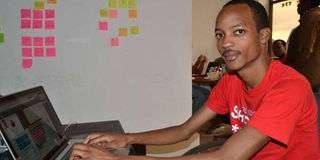Kago Kagichiri: taking education to the next level

Kago Kagichiri, co-founder and Chief Technology Officer of Eneza Education, a platform that gives students education resources via local mobile phone. April 16, 2015. PHOTO | JEFF ANGOTE
What you need to know:
Name: Kago Kagichiri
Age: 27
Achievement: Developed an award-winning app that provides 660,000 pupils across Kenya with interactive quizzes, mini lessons and live chats with teachers.
Position: Co-founder, Eneza Education (Eneza Education is one of Fast Company’s 2015 top 10 Most Innovative Companies in Africa).
Awards: One of Forbes 30 under 30 entrepreneurs of 2015.
Kago Kagichiri rarely watched television while growing up. His parents thought it was a waste of time.
“My mother is an interior and fashion designer, my father an engineer. Watching TV to them was a sign that we were idle, and they would quickly find something for us to do,” says Kago.
He became fascinated with computers from a young age. In fact, he was only seven when he began hacking and coding.
“As I explored the internet, I found websites with content that interested me, and I would try to restructure the websites to get through. This is how I got introduced to the world of hacking, something I am now embarrassed about.”
He was so preoccupied with computers that his parents banned him from using them when he was about to sit for his Kenya Certificate of Primary Education (KCPE) exam, afraid that this obsession
would affect his performance.
A bright pupil, he performed well enough to join Starehe Boys Centre, where he spent a lot of his free time in the computer lab, dabbling in computer programming.
He soon became the self-appointed IT support guy for fellow students.
When two computer studies teachers resigned, he elected himself manager of the computer lab as well as the stand-in instructor, an opportunity he used to perfect his programming skills.
Kago scored A- in his Kenya Certificate of Secondary Education exams, and was admitted to study software engineering at Kenyatta University. However, he decided to join the Jomo Kenyatta
University of Agriculture and Technology (JKUAT) instead.
“One of the reasons I chose JKUAT was because it had a trimester system, which meant I could complete my studies faster,” he said.
BUSINESS SAVVY
Before taking up his studies, he did consulting jobs in software engineering, but two years down the line, he realised that his career was not moving as fast as he would have wanted.
“I assumed it was because I did not have a degree, so I decided to get one,” he said.
Besides teaching him how to become business savvy, he also hoped that a university education would improve his interpersonal skills, which he felt were poor, because he spent most of his time hunched over a computer.
He was disappointed.
“I was underwhelmed,” he said of his university studies. “I just wasn’t getting the skills I was looking for...there was a general lack in quality and relevance in what we were being taught.”
Some of the lecturers, he said, presented poorly researched notes, some out of touch with the evolving business and technology they lectured on.
“I felt brain-drained and decided to start freelancing. Most of the time I’d be working in class instead of taking notes.”
In 2009, after a year in the university, Kago set up an IT consultancy firm, MiliQi Networks. He was 21, dissatisfied and unchallenged, and itching to engage his mind in a more challenging activity.
“Before I finally dropped out, I had just been awarded for topping my course for two years in a row, but even this wasn’t motivation enough to complete my degree,” he said.
In October 2011, while at iHub, East Africa’s leading tech innovation and hackers space in Nairobi, Kago met the partner who would be co-founder of Eneza Education. That was the 32-year-old Toni Maraviglia, an American who had been working as a teacher in rural Kenya.

Kago Kagichiri (left), co-founder and Chief Technology Officer of Eneza Education together with some of his employees. Eneza Education is a platform that gives students education resources via local mobile phone. PHOTO| JEFF ANGOTE
Maraviglia, a UCLA graduate, first visited Kenya in 2008 to set up WISERBridge, an organisation that provides children in rural Kenya better primary and post-primary access to quality education. Theirs was a meeting of two frustrated professionals in their
respective fields, both thirsty for a new challenge that would make a difference.
“She was the teacher who hated technology, and I was the techie who hated teachers - that’s what we like to say,” Kago says.
Maraviglia had witnessed the general challenge teachers in rural Kenya faced; one of them being irregular interaction, which hindered them from following up on their pupils’ progress.
By the time their paths crossed, Kago barely slept, thinking of how to go about creating an application that could make a difference in education; he just hadn’t ironed out the details.
Their partnership gave rise to Eneza Education – an app that targets students between 11 and 18 years in rural areas.
The lessons are accessible via SMS short code, *291#, on simple feature phones for 10 shillings unlimited access to content for study and revision per week."
Most of the app’s users are in Eldoret, Kakamega, Wajir, Mandera, Kwale and the Daadab Refugee Camp.
The two and their team of 12 employees plan to expand to Rwanda, South Africa and Nigeria Next year. They are already in Ghana and Tanzania. Eneza also has a scholarship programme that educates needy, bright students. They are currently educating 17 students.
This initiative is currently getting support from sponsors and seed funders, such as Echoing Green and Unreasonable Institute, both US-based business incubator and early stage investment funds for social entrepreneurs.
In the next year or two, Kago envisions that his venture will begin to generate income and break even. His mission? “To make 50 million children across rural Africa smarter.”





